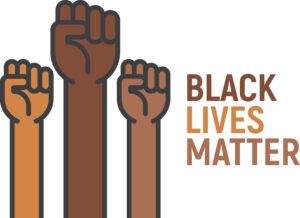Addressing Racial Injustice
 Lafayette’s Diversity, Equity, and Inclusion Council (DEI) and Office of Intercultural Development (OID) came together this spring to create programming that will enable the Lafayette community to share information, reflect on feelings, and document what is happening in response to the Black Lives Matter (BLM) movement, incidents of police brutality against Black people, and the public outcry for justice.
Lafayette’s Diversity, Equity, and Inclusion Council (DEI) and Office of Intercultural Development (OID) came together this spring to create programming that will enable the Lafayette community to share information, reflect on feelings, and document what is happening in response to the Black Lives Matter (BLM) movement, incidents of police brutality against Black people, and the public outcry for justice.
Virtual Town Hall
“A Community Conversation About Racial Injustice” was held June 11 for members of the on-campus community. The virtual town hall, which was attended by 300 people, was introduced by Karina Fuentes, assistant director of intercultural development, and moderated by Luis Schettino, associate professor of psychology and neuroscience. Gladstone “Fluney” Hutchinson, associate professor of economics, delivered opening remarks. Faculty, staff, and students discussed themes relating to campus police practices, experiences of Black faculty members, and students feeling a need for a greater sense of belonging in the Lafayette community. The College’s response to racial tensions that have been experienced on campus even before the recent protests began also was discussed, with those in attendance strongly urging an implementation of institution-wide change that does not fall solely on Black faculty and students. Additional panels were held to discuss anti-racism.
Digital Collection
DEI and OID are creating “Expressions of Solidarity Against Racial Injustice: A Digital Collection,” where members of the Lafayette community can share creative writing, photos, video, audio materials, oral histories, personal essays, visual arts, and published works that are emerging from the multifaceted BLM movement and calls for an anti-racist society. The collection will provide a space to share, narrate, and reflect on the deaths of George Floyd and numerous other members of the Black community, and the protests and events that followed. “Since BLM began in 2016, the interest in community-based participatory collections has grown—a growth that reflects a recognition that people should be empowered to document and share not only what is happening around them, but how it makes them feel and why change is imperative,” note DEI and OID. “When these records are collected and more voices are heard, we can build a more accurate history of these experiences and foster much-needed action for change.”
Join us in this challenge. We need you in our fight to end racism and bias, and to build a more inclusive college and community.
To contribute to the collection, visit scalar.lafayette.edu/expressions-of-solidarity-against-racial-injustice